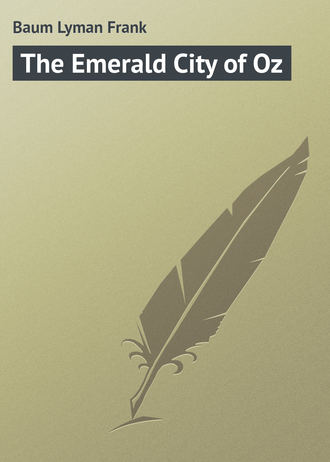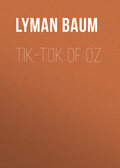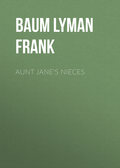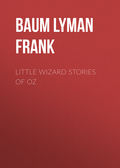
Лаймен Фрэнк Баум
The Emerald City of Oz
CHAPTER EIGHTEEN
How Ozma Looked into the Magic Picture
Princess Ozma was a very busy little ruler, for she looked carefully after the comfort and welfare of her people and tried to make them happy. If any quarrels arose she decided them justly; if any one needed counsel or advice she was ready and willing to listen to them.
For a day or two after Dorothy and her companions had started on their trip, Ozma was occupied with the affairs of her kingdom. Then she began to think of some manner of occupation for Uncle Henry and Aunt Em that would be light and easy and yet give the old people something to do.
She soon decided to make Uncle Henry the Keeper of the Jewels, for some one really was needed to count and look after the bins and barrels of emeralds, diamonds, rubies and other precious stones that were in the Royal Storehouses. That would keep Uncle Henry busy enough, but it was harder to find something for Aunt Em to do. The palace was full of servants, so there was no detail of housework that Aunt Em could look after.
While Ozma sat in her pretty room engaged in thought she happened to glance at her Magic Picture.
This was one of the most important treasures in all the Land of Oz. It was a large picture, set in a beautiful gold frame, and it hung in a prominent place upon a wall of Ozma's private room.
Usually this picture seemed merely a country scene, but whenever Ozma looked at it and wished to know what any of her friends or acquaintances were doing, the magic of this wonderful picture was straightway disclosed. For the country scene would gradually fade away and in its place would appear the likeness of the person or persons Ozma might wish to see, surrounded by the actual scenes in which they were then placed. In this way the Princess could view any part of the world she wished, and watch the actions of any one in whom she was interested.
Ozma had often seen Dorothy in her Kansas home by this means, and now, having a little leisure, she expressed a desire to see her little friend again. It was while the travelers were at Fuddlecumjig, and Ozma laughed merrily as she watched in the picture her friends trying to match the pieces of Grandmother Gnit.
"They seem happy and are doubtless having a good time," the girl Ruler said to herself; and then she began to think of the many adventures she herself had encountered with Dorothy.
The images of her friends now faded from the Magic Picture and the old landscape slowly reappeared.
Ozma was thinking of the time when with Dorothy and her army she marched to the Nome King's underground cavern, beyond the Land of Ev, and forced the old monarch to liberate his captives, who belonged to the Royal Family of Ev. That was the time when the Scarecrow nearly frightened the Nome King into fits by throwing one of Billina's eggs at him, and Dorothy had captured King Roquat's Magic Belt and brought it away with her to the Land of Oz.
The pretty Princess smiled at the recollection of this adventure, and then she wondered what had become of the Nome King since then. Merely because she was curious and had nothing better to do, Ozma glanced at the Magic Picture and wished to see in it the King of the Nomes.
Roquat the Red went every day into his tunnel to see how the work was getting along and to hurry his workmen as much as possible. He was there now, and Ozma saw him plainly in the Magic Picture.
She saw the underground tunnel, reaching far underneath the Deadly Desert which separated the Land of Oz from the mountains beneath which the Nome King had his extensive caverns. She saw that the tunnel was being made in the direction of the Emerald City, and knew at once it was being dug so that the army of Nomes could march through it and attack her own beautiful and peaceful country.
"I suppose King Roquat is planning revenge against us," she said, musingly, "and thinks he can surprise us and make us his captives and slaves. How sad it is that any one can have such wicked thoughts! But I must not blame King Roquat too severely, for he is a Nome, and his nature is not so gentle as my own."
Then she dismissed from her mind further thought of the tunnel, for that time, and began to wonder if Aunt Em would not be happy as Royal Mender of the Stockings of the Ruler of Oz. Ozma wore few holes in her stockings; still, they sometimes needed mending. Aunt Em ought to be able to do that very nicely.
Next day the Princess watched the tunnel again in her Magic Picture, and every day afterward she devoted a few minutes to inspecting the work. It was not especially interesting, but she felt that it was her duty.
Slowly but surely the big arched hole crept through the rocks underneath the deadly desert, and day by day it drew nearer and nearer to the Emerald City.
CHAPTER NINETEEN
How Bunnybury Welcomed the Strangers
Dorothy left Bunbury the same way she had entered it and when they were in the forest again she said to Billina:
"I never thought that things good to eat could be so dis'gree'ble."
"Often I've eaten things that tasted good but were disagreeable afterward," returned the Yellow Hen. "I think, Dorothy, if eatables are going to act badly, it's better before than after you eat them."
"P'raps you're right," said the little girl, with a sigh. "But what shall we do now?"
"Let us follow the path back to the signpost," suggested Billina. "That will be better than getting lost again."
"Why, we're lost anyhow," declared Dorothy; "but I guess you're right about going back to that signpost, Billina."
They returned along the path to the place where they had first found it, and at once took "the other road" to Bunnybury. This road was a mere narrow strip, worn hard and smooth but not wide enough for Dorothy's feet to tread. Still it was a guide, and the walking through the forest was not at all difficult.
Before long they reached a high wall of solid white marble, and the path came to an end at this wall.
At first Dorothy thought there was no opening at all in the marble, but on looking closely she discovered a small square door about on a level with her head, and underneath this closed door was a bell-push. Near the bell-push a sign was painted in neat letters upon the marble, and the sign read:
No Admittance
Except on Business
This did not discourage Dorothy, however, and she rang the bell.
Pretty soon a bolt was cautiously withdrawn and the marble door swung slowly open. Then she saw it was not really a door, but a window, for several brass bars were placed across it, being set fast in the marble and so close together that the little girl's fingers might barely go between them. Back of the bars appeared the face of a white rabbit – a very sober and sedate face – with an eye-glass held in his left eye and attached to a cord in his button-hole.
"Well! what is it?" asked the rabbit, sharply.
"I'm Dorothy," said the girl, "and I'm lost, and – "
"State your business, please," interrupted the rabbit.
"My business," she replied, "is to find out where I am, and to – "
"No one is allowed in Bunnybury without an order or a letter of introduction from either Ozma of Oz or Glinda the Good," announced the rabbit; "so that that settles the matter," and he started to close the window.
"Wait a minute!" cried Dorothy. "I've got a letter from Ozma."
"From the Ruler of Oz?" asked the rabbit, doubtingly.
"Of course. Ozma's my best friend, you know; and I'm a Princess myself," she announced, earnestly.
"Hum – ha! Let me see your letter," returned the rabbit, as if he still doubted her.
So she hunted in her pocket and found the letter Ozma had given her. Then she handed it through the bars to the rabbit, who took it in his paws and opened it. He read it aloud in a pompous voice, as if to let Dorothy and Billina see that he was educated and could read writing. The letter was as follows:
"It will please me to have my subjects greet Princess Dorothy, the bearer of this royal missive, with the same courtesy and consideration they would extend to me."
"Ha – hum! It is signed 'Ozma of Oz,'" continued the rabbit, "and is sealed with the Great Seal of the Emerald City. Well, well, well! How strange! How remarkable!"
"What are you going to do about it?" inquired Dorothy, impatiently.
"We must obey the royal mandate," replied the rabbit. "We are subjects of Ozma of Oz, and we live in her country. Also we are under the protection of the great Sorceress Glinda the Good, who made us promise to respect Ozma's commands."
"Then may I come in?" she asked.
"I'll open the door," said the rabbit. He shut the window and disappeared, but a moment afterward a big door in the wall opened and admitted Dorothy to a small room, which seemed to be a part of the wall and built into it.
Here stood the rabbit she had been talking with, and now that she could see all of him she gazed at the creature in surprise. He was a good sized white rabbit with pink eyes, much like all other white rabbits. But the astonishing thing about him was the manner in which he was dressed. He wore a white satin jacket embroidered with gold, and having diamond buttons. His vest was rose-colored satin, with tourmaline buttons. His trousers were white, to correspond with the jacket, and they were baggy at the knees – like those of a zouave – being tied with knots of rose ribbons. His shoes were of white plush with diamond buckles, and his stockings were rose silk.
The richness and even magnificence of the rabbit's clothing made Dorothy stare at the little creature wonderingly. Toto and Billina had followed her into the room and when he saw them the rabbit ran to a table and sprang upon it nimbly. Then he looked at the three through his monocle and said:
"These companions, Princess, cannot enter Bunnybury with you."
"Why not?" asked Dorothy.
"In the first place they would frighten our people, who dislike dogs above all things on earth; and, secondly, the letter of the Royal Ozma does not mention them."
"But they're my friends," persisted Dorothy, "and go wherever I go."
"Not this time," said the rabbit, decidedly. "You, yourself, Princess, are a welcome visitor, since you come so highly recommended; but unless you consent to leave the dog and the hen in this room I cannot permit you to enter the town."
"Never mind us, Dorothy," said Billina. "Go inside and see what the place is like. You can tell us about it afterward, and Toto and I will rest comfortably here until you return."
This seemed the best thing to do, for Dorothy was curious to see how the rabbit people lived and she was aware of the fact that her friends might frighten the timid little creatures. She had not forgotten how Toto and Billina had misbehaved in Bunbury, and perhaps the rabbit was wise to insist on their staying outside the town.
"Very well," she said, "I'll go in alone. I s'pose you're the King of this town, aren't you?"
"No," answered the rabbit, "I'm merely the Keeper of the Wicket, and a person of little importance, although I try to do my duty. I must now inform you, Princess, that before you enter our town you must consent to reduce."
"Reduce what?" asked Dorothy.
"Your size. You must become the size of the rabbits, although you may retain your own form."
"Wouldn't my clothes be too big for me?" she inquired.
"No; they will reduce when your body does."
"Can you make me smaller?" asked the girl.
"Easily," returned the rabbit.
"And will you make me big again, when I'm ready to go away?"
"I will," said he.
"All right, then; I'm willing," she announced.
The rabbit jumped from the table and ran – or rather hopped – to the further wall, where he opened a door so tiny that even Toto could scarcely have crawled through it.
"Follow me," he said.
Now, almost any other little girl would have declared that she could not get through so small a door; but Dorothy had already encountered so many fairy adventures that she believed nothing was impossible in the Land of Oz. So she quietly walked toward the door, and at every step she grew smaller and smaller until, by the time the opening was reached, she could pass through it with ease. Indeed, as she stood beside the rabbit, who sat upon his hind legs and used his paws as hands, her head was just about as high as his own.
Then the Keeper of the Wicket passed through and she followed, after which the door swung shut and locked itself with a sharp click.
Dorothy now found herself in a city so strange and beautiful that she gave a gasp of surprise. The high marble wall extended all around the place and shut out all the rest of the world. And here were marble houses of curious forms, most of them resembling overturned kettles but with delicate slender spires and minarets running far up into the sky. The streets were paved with white marble and in front of each house was a lawn of rich green clover. Everything was as neat as wax, the green and white contrasting prettily together.
But the rabbit people were, after all, the most amazing things Dorothy saw. The streets were full of them, and their costumes were so splendid that the rich dress of the Keeper of the Wicket was commonplace when compared with the others. Silks and satins of delicate hues seemed always used for material, and nearly every costume sparkled with exquisite gems.
But the lady rabbits outshone the gentlemen rabbits in splendor, and the cut of their gowns was really wonderful. They wore bonnets, too, with feathers and jewels in them, and some wheeled baby carriages in which the girl could see wee bunnies. Some were lying asleep while others lay sucking their paws and looking around them with big pink eyes.
As Dorothy was no bigger in size than the grown-up rabbits she had a chance to observe them closely before they noticed her presence. Then they did not seem at all alarmed, although the little girl naturally became the center of attraction and all regarded her with great curiosity.
"Make way!" cried the Keeper of the Wicket, in a pompous voice; "make way for Princess Dorothy, who comes from Ozma of Oz."
Hearing this announcement, the throng of rabbits gave place to them on the walks, and as Dorothy passed along they all bowed their heads respectfully.
Walking thus through several handsome streets they came to a square in the center of the City. In this square were some pretty trees and a statue in bronze of Glinda the Good, while beyond it were the portals of the Royal Palace – an extensive and imposing building of white marble covered with a filigree of frosted gold.
CHAPTER TWENTY
How Dorothy Lunched With a King
A line of rabbit soldiers was drawn up before the palace entrance, and they wore green and gold uniforms with high shakos upon their heads and held tiny spears in their hands. The Captain had a sword and a white plume in his shako.
"Salute!" cried the Keeper of the Wicket. "Salute Princess Dorothy, who comes from Ozma of Oz!"
"Salute!" yelled the Captain, and all the soldiers promptly saluted.
They now entered the great hall of the palace, where they met a gaily dressed attendant, from whom the Keeper of the Wicket inquired if the King were at leisure.
"I think so," was the reply. "I heard his Majesty blubbering and wailing as usual only a few minutes ago. If he doesn't stop acting like a cry-baby I'm going to resign my position here and go to work."
"What's the matter with your King?" asked Dorothy, surprised to hear the rabbit attendant speak so disrespectfully of his monarch.
"Oh, he doesn't want to be King, that's all; and he simply has to," was the reply.
"Come!" said the Keeper of the Wicket, sternly; "lead us to his Majesty; and do not air our troubles before strangers, I beg of you."
"Why, if this girl is going to see the King, he'll air his own troubles," returned the attendant.
"That is his royal privilege," declared the Keeper.
So the attendant led them into a room all draped with cloth-of-gold and furnished with satin-covered gold furniture. There was a throne in this room, set on a dais and having a big cushioned seat, and on this seat reclined the Rabbit King. He was lying on his back, with his paws in the air, and whining very like a puppy-dog.
"Your Majesty! your Majesty! Get up. Here's a visitor," called out the attendant.
The King rolled over and looked at Dorothy with one watery pink eye. Then he sat up and wiped his eyes carefully with a silk handkerchief and put on his jeweled crown, which had fallen off.
"Excuse my grief, fair stranger," he said, in a sad voice. "You behold in me the most miserable monarch in all the world. What time is it, Blinkem?"
"One o'clock, your Majesty," replied the attendant to whom the question was addressed.
"Serve luncheon at once!" commanded the King. "Luncheon for two – that's for my visitor and me – and see that the human has some sort of food she's accustomed to."
"Yes, your Majesty," answered the attendant, and went away.
"Tie my shoe, Bristle," said the King to the Keeper of the Wicket. "Ah, me! how unhappy I am!"
"What seems to be worrying your Majesty?" asked Dorothy.
"Why, it's this king business, of course," he returned, while the Keeper tied his shoe. "I didn't want to be King of Bunnybury at all, and the rabbits all knew it. So they elected me – to save themselves from such a dreadful fate, I suppose – and here I am, shut up in a palace, when I might be free and happy."
"Seems to me," said Dorothy, "it's a great thing to be a King."
"Were you ever a King?" inquired the monarch.
"No," she answered, laughing.
"Then you know nothing about it," he said. "I haven't inquired who you are, but it doesn't matter. While we're at luncheon, I'll tell you all my troubles. They're a great deal more interesting than anything you can say about yourself."
"Perhaps they are, to you," replied Dorothy.
"Luncheon is served!" cried Blinkem, throwing open the door, and in came a dozen rabbits in livery, all bearing trays which they placed upon the table, where they arranged the dishes in an orderly manner.
"Now clear out – all of you!" exclaimed the King. "Bristle, you may wait outside, in case I want you."
When they had gone and the King was alone with Dorothy he came down from his throne, tossed his crown into a corner and kicked his ermine robe under the table.
"Sit down," he said, "and try to be happy. It's useless for me to try, because I'm always wretched and miserable. But I'm hungry, and I hope you are."
"I am," said Dorothy. "I've only eaten a wheelbarrow and a piano to-day – oh, yes! and a slice of bread and butter that used to be a door-mat."
"That sounds like a square meal," remarked the King, seating himself opposite her; "but perhaps it wasn't a square piano. Eh?"
Dorothy laughed.
"You don't seem so very unhappy now," she said.
"But I am," protested the King, fresh tears gathering in his eyes. "Even my jokes are miserable. I'm wretched, woeful, afflicted, distressed and dismal as an individual can be. Are you not sorry for me?"
"No," answered Dorothy, honestly, "I can't say I am. Seems to me that for a rabbit you 're right in clover. This is the prettiest little city I ever saw."
"Oh, the city is good enough," he admitted. "Glinda, the Good Sorceress, made it for us because she was fond of rabbits. I don't mind the City so much, although I wouldn't live here if I had my choice. It is being King that has absolutely ruined my happiness."
"Why wouldn't you live here by choice?" she asked.
"Because it is all unnatural, my dear. Rabbits are out of place in such luxury. When I was young I lived in a burrow in the forest. I was surrounded by enemies and often had to run for my life. It was hard getting enough to eat, at times, and when I found a bunch of clover I had to listen and look for danger while I ate it. Wolves prowled around the hole in which I lived and sometimes I didn't dare stir out for days at a time. Oh, how happy and contented I was then! I was a real rabbit, as nature made me – wild and free! – and I even enjoyed listening to the startled throbbing of my own heart!"
"I've often thought," said Dorothy, who was busily eating, "that it would be fun to be a rabbit."
"It is fun – when you're the genuine article," agreed his Majesty. "But look at me now! I live in a marble palace instead of a hole in the ground. I have all I want to eat, without the joy of hunting for it. Every day I must dress in fine clothes and wear that horrible crown till it makes my head ache. Rabbits come to me with all sorts of troubles, when my own troubles are the only ones I care about. When I walk out I can't hop and run; I must strut on my rear legs and wear an ermine robe! And the soldiers salute me and the band plays and the other rabbits laugh and clap their paws and cry out: 'Hail to the King!' Now let me ask you, as a friend and a young lady of good judgment: isn't all this pomp and foolishness enough to make a decent rabbit miserable?"
"Once," said Dorothy, reflectively, "men were wild and unclothed and lived in caves and hunted for food as wild beasts do. But they got civ'lized, in time, and now they'd hate to go back to the old days."
"That is an entirely different case," replied the King. "None of you Humans were civilized in one lifetime. It came to you by degrees. But I have known the forest and the free life, and that is why I resent being civilized all at once, against my will, and being made a King with a crown and an ermine robe. Pah!"
"If you don't like it, why don't you resign?" she asked.
"Impossible!" wailed the Rabbit, wiping his eyes again with his handkerchief. "There's a beastly law in this town that forbids it. When one is elected a King there's no getting out of it."
"Who made the laws?" inquired Dorothy.
"The same Sorceress who made the town – Glinda the Good. She built the wall, and fixed up the City, and gave us several valuable enchantments, and made the laws. Then she invited all the pink-eyed white rabbits of the forest to come here, after which she left us to our fate."
"What made you 'cept the invitation, and come here?" asked the child.
"I didn't know how dreadful city life was, and I'd no idea I would be elected King," said he, sobbing bitterly. "And – and – now I'm It – with a capital I – and can't escape!"
"I know Glinda," remarked Dorothy, eating for dessert a dish of charlotte russe, "and when I see her again I'll ask her to put another King in your place."
"Will you? Will you, indeed?" asked the King, joyfully.
"I will if you want me to," she replied.
"Hurroo – hurray!" shouted the King; and then he jumped up from the table and danced wildly about the room, waving his napkin like a flag and laughing with glee.
After a time he managed to control his delight and returned to the table.
"When are you likely to see Glinda?" he inquired.
"Oh, p'raps in a few days," said Dorothy.
"And you won't forget to ask her?"
"Of course not."
"Princess," said the Rabbit King, earnestly, "you have relieved me of a great unhappiness, and I am very grateful. Therefore I propose to entertain you, since you are my guest and I am the King, as a slight mark of my appreciation. Come with me to my reception hall."
He then summoned Bristle and said to him: "Assemble all the nobility in the great reception hall, and also tell Blinkem that I want him immediately."
The Keeper of the Wicket bowed and hurried away, and his Majesty turned to Dorothy and continued: "We'll have time for a walk in the gardens before the people get here."
The gardens were back of the palace and were filled with beautiful flowers and fragrant shrubs, with many shade and fruit trees and marble paved walks running in every direction. As they entered this place Blinkem came running to the King, who gave him several orders in a low voice. Then his Majesty rejoined Dorothy and led her through the gardens, which she admired very much.
"What lovely clothes your Majesty wears!" she said, glancing at the rich blue satin costume, embroidered with pearls, in which the King was dressed.
"Yes," he returned, with an air of pride, "this is one of my favorite suits; but I have a good many that are even more elaborate. We have excellent tailors in Bunnybury, and Glinda supplies all the material. By the way, you might ask the Sorceress, when you see her, to permit me to keep my wardrobe."
"But if you go back to the forest you will not need clothes," she said.
"N – o!" he faltered; "that may be so. But I've dressed up so long that I'm used to it, and I don't imagine I'd care to run around naked again. So perhaps the Good Glinda will let me keep the costumes."
"I'll ask her," agreed Dorothy.
Then they left the gardens and went into a fine big reception hall, where rich rugs were spread upon the tiled floors and the furniture was exquisitely carved and studded with jewels. The King's chair was an especially pretty piece of furniture, being in the shape of a silver lily with one leaf bent over to form the seat. The silver was everywhere thickly encrusted with diamonds and the seat was upholstered in white satin.
"Oh, what a splendid chair!" cried Dorothy, clasping her hands admiringly.
"Isn't it?" answered the King, proudly. "It is my favorite seat, and I think it especially becoming to my complexion. While I think of it, I wish you'd ask Glinda to let me keep this lily chair when I go away."
"It wouldn't look very well in a hole in the ground, would it?" she suggested.
"Maybe not; but I'm used to sitting in it and I'd like to take it with me," he answered. "But here come the ladies and gentlemen of the court; so please sit beside me and be presented."







